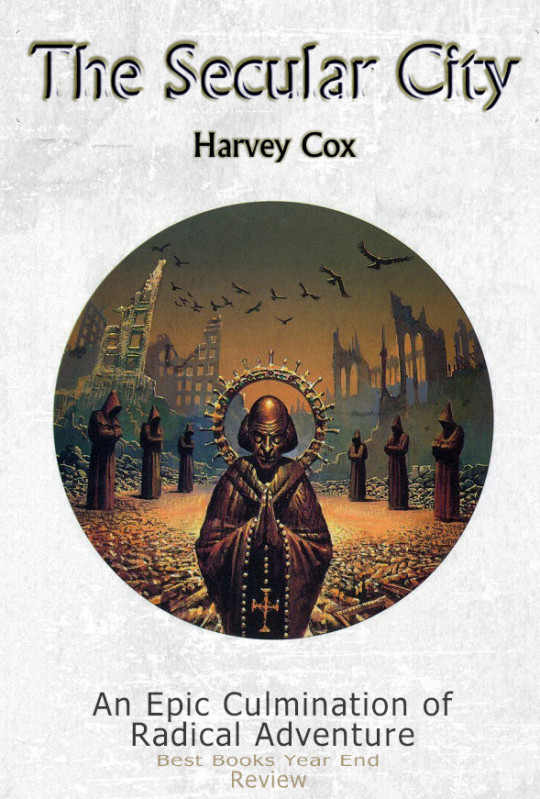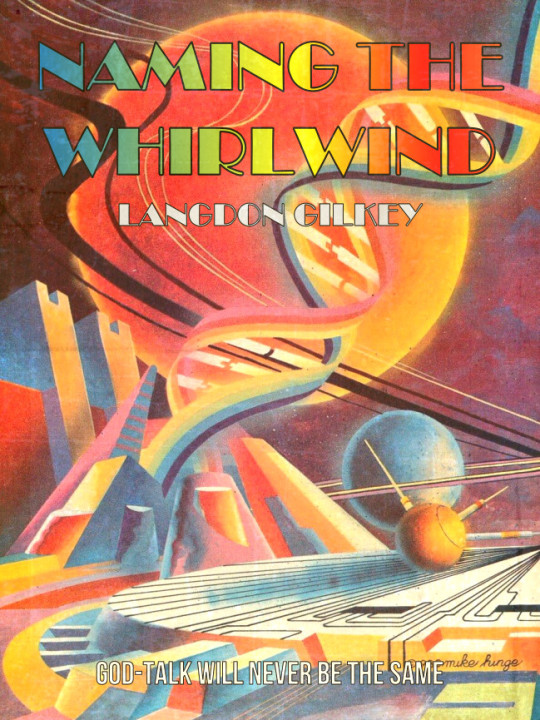#radical theology
Text

1 note
·
View note
Text
"Eschewing both the reductionism of uncomplicated belief and disbelief, being neither the traditionally faithful nor atheistic, radical theology took religion seriously but aimed to construct revolutionary and liberatory understandings of myth, ritual, and scripture that could speak to the dearth of meaning in our contemporary moment. If anything, there was a sense that religion was too important to be left to the religious, and that in the example of past idiosyncratic, eccentric, or iconoclastic thinkers and movements, there could be a way to model more emancipatory practices and theologies for the future. Radical theology is a broad congregation, but as an approach what it shares is an acknowledgement of how damaging orthodox modes of belief can be, with a utopian desire to forge a new way of worshiping, praying, contemplating, and agitating."
Simon , Ed. “Radical Theology: A Syllabus.” JSTOR Daily, 4 Mar. 2023, source.
0 notes
Link
for the first part: https://podcasts.apple.com/us/podcast/72-filipino-nightmare-w-victor-aguilan/id1454553904?i=1000512768620
#theology#theology of struggle#liberation theology#victor aguilan#radical theology#radical christianity
3 notes
·
View notes
Photo






Theological Texts as Pulp Sci-fi pt 16 — Radical Theology Edition
T.J.J. Altizer — Godhead and the Nothing
Jordan Miller — Resisting Theology, Furious Hope
Dorothee Sölle — Death By Bread Alone
John D Caputo — The Prayers and Tear of Jacques Derrida
Harvey Cox — The Secular City
Langdon Gilkey — Naming the Whirlwind
#theology#radical theology#death of god#sci-fi#pulp sci-fi#tjj altizer#jordan miller#dorothee solle#john caputo#harvey cox#langdon gilkey#thomas jj altizer
2 notes
·
View notes
Text
Church of fuck- ups
I hereby declare the church of fuck-ups
we are a silent disorder messed up
we don’t have it all together
and are not ashamed to fail
we are all the same from G’ds point of view
there is no difference between me and you
I’m not going to judge you because i think/ sin different than you
we live in the same world broken
so we will love amongst those who need breaks
and wont use bibletexts to choke them
but speak up for marginalized for G’ds sake
we aren’t perfect and not afraid to admit it
we find hope and roses in the shit
we are all uniquely formed and know that it matters
sacred and scared share the same letters
and we know deep in our soul that we are both
we make fun of marketingplans and growth
cause too much order and structure is a curse
we don’t have to play church
or pretend and act a certain way
we’re just undisciplined disciples
dizzy from this day and age
let there be no leaders and titles
no powergames or religious recitals
seeing kingdom grow and come
in a bottom up grassroots fashion
we rebel against signs and blunders
and find truth in beauty, awe and wonder
but even in wounded souls and torn hearts
we find the letters written from G’d
not in the bombardment of books
or the discomfort of critical looks
Lets cut ourselves loose from the ought-to-tiranny
Lets be devoted dissidents and provoke prophecy
unashamed of our deep messy spirituality
our unpredictable lives committed to the spirit of spontaneity
we are the church of fuck-ups
were Christ can be found in the midst
of burned-out believers and moral misfits
we are are imperfect and unfinished
amen
https://www.youtube.com/watch?v=m4s9qNCAZjY
0 notes
Text
the story we tell ourselves about ourselves in order to avoid the truth
Peter Rollins
1 note
·
View note
Link
This is sort of a distillation of a thread that was on Twitter a few days ago. Mister Rogers was probably as close as humanity can get to producing a real saint. This is also a good reminder that the right wing does not get to own religious faith. They’re loud and divisive and they get a lot of undue attention. But they don’t own it, and we shouldn’t let them. Anyway, have a read. You’ll be glad you did.
Actually, here’s the thread. It’s more detailed and really moving.
17 notes
·
View notes
Text
The Corporealness of God
“In this one image of the world as God’s body, we are invited to see the creator in the creation, the source of all existence in and through what is bodied forth from that source.” –Sally McFague
Below is a comment I left on a thread in the radical theology fb group (a very good discussion group that I highly recommend joining!). I left the comment in reply to Alan Darley’s criticism masked as a question: “Do panentheists think God is corporeal after all?” I say it’s a criticism masked as a question because Darley posted the comment below early on in the thread, indicating that he sort of had his mind made up already…
“In an attempt to ‘dehellenise’ Christianity, the panentheists and process thinkers have succumbed to the worst aspects of Greek thought themselves – that is a finite god like Plato’s demiurge limited by eternal ‘matter.’ It is a denial of creation ex nihilo and with it a denial of the radically different mode of being between Creator and creature (sometimes called the ‘ontological difference’). Aquinas explains that ‘some have believed God to be a body,’ since they have failed to understand that, ‘by this word “God” is signified something than which nothing greater can be thought.’”
I also talk below about the charge made in the thread of process theology being ontotheological, a criticism that’s never really bothered me as a process thinker.
…
As someone who currently thinks of themself as a process-relational panentheist I do think of the World as God’s body in some sense, and folks like Hartshorne and Sally McFague have been influential to me on this. So yeah, God is corporeal in some ways and, among other things, this has incredible implications for how we think about and treat the environment…
But unlike emanationist versions of panentheism/pantheism, like Spinoza’s, where all activity that happens around us and within us is the outcome of God “godding,” Whiteheadian influenced process-relational panentheism has multiple creative powers, not just God. In fact, as Whitehead says, “It is as true to say that God creates the World, as that the World creates God.” And that’s the radical claim of process theology that I love; that God is affected by us, not unmoved and dis-affected as someone like Anselm might claim. This doesn’t mean God is finite or reduced down to Plato’s demiurge, as Alan has suggested above; All process thinkers would still affirm that God is more than the world and cannot be fully identified nor comprehended fully by any creature. McFague and other feminist panentheistic theologians make this pretty clear. McFague, for instance, suggests in her book “God’s World is God’s Body” that just like God’s creatures have a body – or are bodies, these creatures are more than pure bodies. Likewise, God’s world is God’s body but God and God’s body are not identical, even though the world can be considered as part of God’s identity. For McFague, every entity, even atoms, can be understood as a “body.” So for McFague then (and other feminist theologians like Catherine Keller for instance), God’s transcendence is immanent in the world respectively in creation; It is through our experience of the world that we experience God’s immanent transcendence and God’s transcendent immanence. But McFague makes a big point to say that all we can experience is God’s back, citing Exodus 33:23, indicating that neither theology nor philosophy will ever find adequate terms to describe God’s face. All we can (and should!) do, is turn our attention to the planet, which is a reflection of God’s back. As McFague says we are “invited to see the creator in the creation, the source of all existence in and through what is bodied forth from that source.”
As for the charge of ontotheology leveled against process theology above, I think Don was right in one of his comments: ontotheology is not a meaningful category for process metaphysics; the poststructuralist, apophatic translations of process thought (that come from folks like Keller, Thatamanil and Faber et al) dismantled this charge a while ago.
The Corporealness of God was originally published on TURRI
#catherine keller#Charles Hartshorne#panentheism#process theology#radical theology#roland faber#sally mcfague#theology
0 notes
Quote
God is a question, not an answer, the most radical thought we can entertain, that exposes the questionability of all the other answers we think we have, exposing the fragility of [religion], the revisability of the determinate structures within which the various religions conduct their business, forcing them to ask themselves again and again, “what do I love when I love my God?”
John D. Caputo, from “On Religion”
2 notes
·
View notes
Link
Episode #8: Deconstruction [Derrida>Caputo>Rollins]
In this solo-episode, I quote such theologians/philosophers as Steven Shakespeare, Jacques Derrida, John Caputo, and Peter Rollins, tracing the early roots of deconstrucion and postmodernism from a new angle. Maybe you’ll learn a couple things. I know that I did!!

#deconstruction#post-christianity#christianity#pyrotheology#radical theology#shakespeare#derrida#caputo#rollins#ressurrection#insurrection#philosophy#theology
0 notes
Text
"The horrors of both the Holocaust and Hiroshima put the venerable philosophical questions of theodicy—How could an all-powerful and all-good God allow for evil?—into stark and visceral relief. For many, no doubt, there was a sense that the traditional understanding of God was at best naïve and at worst an obscenity. For a contingent of radical theologians sometimes referred to as the “God is Dead” movement, there developed a sense that orthodox approaches to faith were now clearly unjustifiable, but that religious history and thought still provided a potent poetics for understanding God’s silence."
Simon , Ed. “Radical Theology: A Syllabus.” JSTOR Daily, 4 Mar. 2023, source.
0 notes
Quote
To carefully and thoughtfully tend to the deepest, subtlest, and most powerful parts of the mind–what is called the soul, which contains both our deepest love and our greatest fears–so carefully as Maoism does, this is what many people, myself included, understand as spirituality (or, if one prefers, the science of wisdom).
On Maoism’s ability to incorporate and be strengthened by what is sometimes called spirituality
6 notes
·
View notes
Text
radical theologians on a suspended edge
Dietrich Bonhoeffer had suggested in 1944 that God emptied himself, willingly became weak, withdrew from the cultural world, and died by us and to us, leaving only his trace behind. In the 1960s, "death-of-god theologians" Thomas Altizer and William Hamilton took on this suggestion and promised an explosive fusion of St. Paul's confession of God's weakness in 1 Corinthians 25 and Nietzsche's proclamation that God is dead. Death of God theology proposes that subjective experience of God’s absence is the basis of the subject’s responsible engagement with the world.
But their act did not prove intellectually fertile. It remains unclear, even after so long, how much of the traditional Christian doctrine the movement is willing to preserve. Radical theologians do not propose new clear statements on the resurrection nor do they defend analytically clear interpretations of Nietzsche's proclamation. They reject the idea of a grand narrative, deny God the usual categories of substance or person and are uncomfortable with the concept of objective facts.
They only openly attempt to keep existential experience and cultural experience exposed to "God-the-event" (Caputo). But this remains undeveloped. The movement's option for theopoetics and for fluid forms of continental philosophical expression makes it difficult to see how this could become a disciplined intellectual school.
What remains under the smokescreen is only the existential statement of despair, the statement of being cut off from all forms of life. It is the cry of one on a shrinking edge, the one with nothing to hold on to, on either side of the cut.
1 note
·
View note
Video
youtube
Peter Rollins - Pints and Parables - Jesus sucks at golf
0 notes
Text
Counter culture is important.
1 note
·
View note
Audio
Andy and Mandi discuss some ideas from Peter Rollins: pyro-theology, meaning, and the idolatry of God.
0 notes